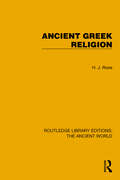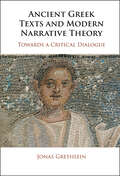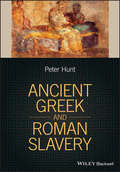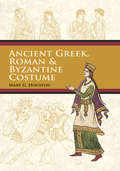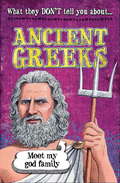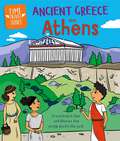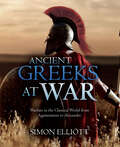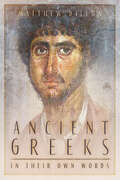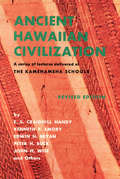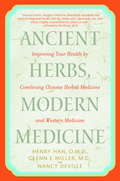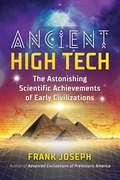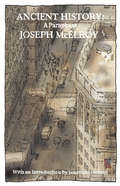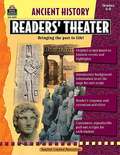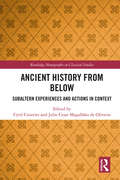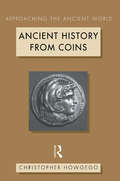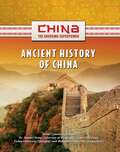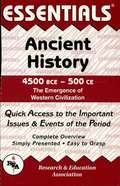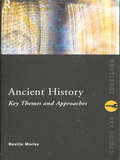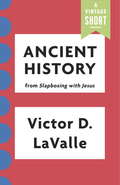- Table View
- List View
Ancient Greek Religion (Routledge Library Editions: The Ancient World)
by H.J. RoseAncient Greek Religion (1948) looks at the religious beliefs and practices of classical Greece. Completely different to the religions as practiced today, the religion of ancient Greece had no creed, nothing like a code or system of morality that worshippers had to adhere to; nor was there a system of ecclesiastical authority. These fundamentally different facets are examined, and the picture of ancient religion is clarified and expanded.
Ancient Greek Texts and Modern Narrative Theory: Towards a Critical Dialogue
by Jonas GrethleinThe taxonomies of narratology have proven valuable tools for the analysis of ancient literature, but, since they were mostly forged in the analysis of modern novels, they have also occluded the distinct quality of ancient narrative and its understanding in antiquity. Ancient Greek Texts and Modern Narrative Theory paves the way for a new approach to ancient narrative that investigates its specific logic. Jonas Grethlein's sophisticated discussion of a wide range of literary texts in conjunction with works of criticism sheds new light on such central issues as fictionality, voice, Theory of Mind and narrative motivation. The book provides classicists with an introduction to ancient views of narrative but is also a major contribution to a historically sensitive theory of narrative.
Ancient Greek and Roman Slavery
by Peter HuntAn exciting study of ancient slavery in Greece and Rome This book provides an introduction to pivotal issues in the study of classical (Greek and Roman) slavery. The span of topics is broad—ranging from everyday resistance to slavery to philosophical justifications of slavery, and from the process of enslavement to the decline of slavery after the fall of the Western Roman Empire. The book uses a wide spectrum of types of evidence, and relies on concrete and vivid examples whenever possible. Introductory chapters provide historical context and a clear and concise discussion of the methodological difficulties of studying ancient slavery. The following chapters are organized around central topics in slave studies: enslavement, economics, politics, culture, sex and family life, manumission and ex-slaves, everyday conflict, revolts, representations, philosophy and law, and decline and legacy. Chapters open with general discussions of important scholarly controversies and the challenges of our ancient evidence, and case studies from the classical Greek, Hellenistic, and Roman periods provide detailed and concrete explorations of the issues. Organized by key themes in slave studies with in-depth classical case studies Emphasizes Greek/Roman comparisons and contrasts Features helpful customized maps Topics range from demography to philosophy, from Linear B through the fall of the empire in the west Features myriad types of evidence: literary, historical, legal and philosophical texts, the bible, papyri, epitaphs, lead letters, curse tablets, art, manumission inscriptions, and more Ancient Greek and Roman Slavery provides a general survey of classical slavery and is particularly appropriate for college courses on Greek and Roman slavery, on comparative slave societies, and on ancient social history. It will also be of great interest to history enthusiasts and scholars, especially those interested in slavery in different periods and societies.
Ancient Greek, Roman & Byzantine Costume
by Mary G. HoustonThis scrupulously researched and abundantly illustrated book includes 315 drawings based on renderings by artists of the period to achieve utmost accuracy and authenticity.Included are elaborate examples of Aegean costume, Doric and Ionic styles of dress for women, Greek and Roman armor, graceful and intricately arranged Roman togas, the tunica — roomy, wide-sleeved apparel; and the pallium, a cloak-like garment. Ornate vestments of the Eastern Orthodox Church and Byzantine costumes are carefully described and portrayed, as are styles of hairdressing, jewelry, and other decorative elements.An excellent reference for the history classroom, the volume also includes instructions and flat patterns showing the cut of sample garments, making it easy for costume designers to reproduce period apparel. This book will be valuable as well to costume historians and art students interested in the development of representative art.
Ancient Greeks (What They Don't Tell You About #34)
by Robert FowkeDid you know that Greek athletes used to win olive oil as prizes? From heroes to philosophers, the Ancient Greeks have had a gigantic influence on life as we know it! Any old history book will give you the boring facts THEY think you should know, but only this one will dish the real dirt on those Ancient Greek culture vultures.They may have lived more than two thousand years ago but this ancient civilisation's legacy goes on in our politics, the Olympic Games, in our alphabet, architecture, science and philosophy. Find out everything you need to know about, plus the answer to some unexpected questions...?Why did Alexander the Great think beards were dangerous in battle?Which Greek writer died when an eagle dropped a tortoise on his head?
Ancient Greeks and Athens (Time Travel Guides #5)
by Sarah RidleyStep back in time to discover life in the ancient Greek city-state of Athens with this handy time travel guidebookTravel back in time to the ancient Greek city-state of Athens and find out all about ancient Greek life and culture. Get ready to visit the temples at the Acropolis, socialise at a symposium, see democracy in action, get fit at a local gymnasium and watch a brand new play at an outdoor theatre. Like modern travel guides, the books in this series highlight must-see features and explain local culture. Each highlighted destination contains an explanation of what took part in these areas, as well as a look at important artefacts found there providing a bigger picture of life in the past. Typical travel guide notes include, 'best time to visit', 'what to eat' and 'where to stay'. Perfect for the KS2 history curriculum, and for readers aged 7 and up.Titles in the series:The Ancient Egyptians and ThebesThe Ancient Greeks and AthensThe Maya and Chichén ItzáRoman Britain and LondiniumThe Shang Dynasty and YinxuThe Stone Age and Skara BraeThe Victorians and LondonViking Britain and Jorvik
Ancient Greeks at War: Warfare in the Classical World from Agamemnon to Alexander
by Simon Elliott&“A detailed, insightful survey of Greek warfare&” with illustrations and &“many well-informed and highly perceptive observations&” (Choice). In this book, historian and archaeologist Simon Elliott considers the different fighting styles of Greek armies and discusses how Greek battles unfolded. Covering every aspect of warfare in the Ancient Greek world from the beginnings of Greek civilization to its assimilation into the ever-expanding world of Rome, it begins with the onset of Minoan culture on Crete around 2000 BC, then covers the arrival of the Mycenaean civilization and the ensuing Late Bronze Age Collapse before moving on to Dark Age and Archaic Greece. This sets the scene for the flowering of Classical Greek civilization, as told through detailed narratives of the Greek and Persian Wars, the Peloponnesian Wars, and the rise of Thebes as a major power. The book then moves on to Macedonian domination under Philip II, before focusing on the exploits of his son Alexander the Great, the all-conquering hero of the ancient world. His legacy was the Hellenistic world with its multiple, never-ending series of conflicts that took place over a huge territory, ranging from Italy in the west all the way to India in the east. Topics covered include the various Wars of the Successors, the rise of the Bactrian-Greek and Indo-Greek kingdoms, the wars between the Antigonid Macedonian, Seleucid, and Ptolemaic kingdoms, and later the clash of cultures between the rising power of Rome in the west and the Hellenistic kingdoms. In the long run the latter proved unable to match Rome&’s insatiable desire for conquest in the eastern Mediterranean, and this together with the rise of Parthia in the east ensured that one by one the Hellenistic kingdoms and states fell. The book ends with the destruction of Corinth in 146 BC after the defeat by Rome of the Achaean League—and concludes by considering the legacy of the Ancient Greeks in the Roman world, and subsequently. &“A comprehensive survey, smoothly written by an expert popularizer of ancient history. A tour de force.&” —NYMAS Review
Ancient Greeks in Their Own Words: History And Culture From Archaic Times To The Death Of Alexander
by Matthew DillonThis volume offers an eyewitness account of life in the classical world. The author has selected a series of telling extracts from Greek literature to provide a picture of the customs, concerns and underlying values of the ancient Greeks. The Greeks speak for themselves, both in the formal language of public office and in the colloquial speech of the household and the street. Their words reveal activities and opinions which are sometimes remarkably similar to those of the modern day, but which are otherwise so different that they are difficult for us to understand. The extracts have been selected from a variety of sources and record not only the lives of famous Greeks, but - perhaps more importantly - offer an insight into the lives of more ordinary individuals. Poetry, hymns and war-songs are included, as are quotations from official documents, inscriptions, laws, histories, funerary monuments, war-memorials and graffiti. This compilation gives an impression of the public and private facets of Greek life, providing an insight into the mentality of the Greeks.
Ancient Hawaiian Civilization
by e. s. Craighill HandyAncient Hawaiian Civilization takes us back to Hawaii's " stone age," when there wasn't an alphabet, numbering system, or other civilized distinctions as we know them. Still rules of living, modes, and customs permitted large numbers of people to live healthfully and happily throughout the islands.This fascinating history of Hawaii is " must" reading for anyone who has been, wants to go, or lives in America 's 50th State. This book authoritatively introduces the general reader to what was once a golden era of Hawaiian history and culture, the time when the islands were strictly Hawaiian Hawaii. Though the islands are almost completely westernized today, many facets from this golden age remain to make America's 50th State a " living laboratory" for the cultural and social study of racial migration and assimilation. This volume represents the knowledge and experience of no less than 16 scholars.The combined areas of specialization by no less than 16 authors have been carefully selected and grouped to make up this volume. Together, the authors comprise a truly formidable forum of Hawaiian thought and learning. Ethnologists, geologists, zoologists, and medical doctors are but a few of the areas of specialization represented in these pages.
Ancient Hawaiian Civilization
by e. s. Craighill HandyAncient Hawaiian Civilization takes us back to Hawaii's " stone age," when there wasn't an alphabet, numbering system, or other civilized distinctions as we know them. Still rules of living, modes, and customs permitted large numbers of people to live healthfully and happily throughout the islands.This fascinating history of Hawaii is " must" reading for anyone who has been, wants to go, or lives in America 's 50th State. This book authoritatively introduces the general reader to what was once a golden era of Hawaiian history and culture, the time when the islands were strictly Hawaiian Hawaii. Though the islands are almost completely westernized today, many facets from this golden age remain to make America's 50th State a " living laboratory" for the cultural and social study of racial migration and assimilation. This volume represents the knowledge and experience of no less than 16 scholars.The combined areas of specialization by no less than 16 authors have been carefully selected and grouped to make up this volume. Together, the authors comprise a truly formidable forum of Hawaiian thought and learning. Ethnologists, geologists, zoologists, and medical doctors are but a few of the areas of specialization represented in these pages.
Ancient Herbs, Modern Medicine
by Nancy Deville Henry Han Glenn E. MillerThe best of Eastern and Western medicine in an integrative healing system for the mind, body, and spirit. Now, for the first time, a Western physician and a doctor of Oriental medicine combine the unparalleled technological advances of the West with the unmatched wisdom and healing touch Chinese herbal medicine provides for many diseases and conditions that elude modern medicine. Ancient Herbs, Modern Medicine demonstrates the many important, highly effective ways Chinese medicine and Western medicine can complement each other in treating everything from allergies and insomnia to mental illness and cancer. This accessible, comprehensive guide offers many informative and enlightening case studies and up-to-the-minute information on: * How integrative medicine combines the best of Western pharmacology and Eastern herbology * How integrative medicine helps fight the diseases and illnesses of our time, including allergies, asthma, and chronic fatigue syndrome, and eases and even reverses symptoms of arthritis, diabetes, depression, osteoporosis, AIDS, heart disease, and cancer--often without side effects * How Chinese medicine can help you recognize signs before an illness becomes a crisis * The importance of Western techniques in diagnosing serious diseases * Why Chinese medicine offers the most effective treatment for many chronic/recurrent illnesses * Restoring essential balance to the Five Energetic Systems--the Heart, Lung, Spleen, Liver, and Kidney Energies * The Eight Strategies of Herbal Therapy--how herbs work in your body Plus illuminating discussions of the basic principles of Chinese medicine, as well as food remedy recipes, diagrams, glossaries of medical terms and herbs, resource listings, and much more to help you tailor an integrative health regimen that is right for you.
Ancient High Tech: The Astonishing Scientific Achievements of Early Civilizations
by Frank JosephA detailed look into ancient advanced technology, science, and medicine--some of which has yet to be reproduced today • Explores countless examples of ancient high tech, including robotics, artificial intelligence, aircraft, solar-powered cannons, high-speed drills, illuminated underground temples, massive refrigerators, and subterranean cities • Examines evidence of advanced medicine in ancient times • Includes examples from ancient Egypt, China, Greece, Babylon, Siberia, the Americas, and India The first self-igniting match was invented in 1805 by Jean Chancel, a French chemist. Yet, in Babylon, 3,600 years before, identical sulfur matches were in common use. On the Panchavarnaswamy Temple in India, built millennia ago, there is a detailed carving of a man on a bicycle, yet the bicycle wasn&’t invented in the modern world until 1817. These inventions are only two examples of technology lost in the Dark Ages. Exploring the sophisticated tech achieved by ancient civilizations hundreds and thousands of years ago, Frank Joseph examines evidence of robotics and other forms of artificial intelligence; manned flight, such as hot-air balloons and gliders; and military science, including flamethrowers, biological warfare, poison gas, and solar-powered cannons. He reveals how ancient construction engineers excavated subterranean cities, turned stone walls into glass, lifted 100-ton blocks of granite, illuminated underground temples and pyramids, and stored their food in massive refrigerators. Examples explored in the book include the first known alarm clock, invented by Plato in 4th-century-BC Greece; 600-year-old Aztec whistles that reproduce animal sounds and human voices with uncanny accuracy; Stone Age jewelry from Siberia worked by a high-speed drill; sex robots in ancient Troy, Greece, and China; ancient Egyptian aircraft; and India&’s iron pillar exposed to sixteen hundred years of monsoons but still standing rust-free. The author also explores evidence of advanced medicine in ancient times, particularly in Egypt and China, from brain surgery, optometry, and prosthetics to dentistry, magnet therapy, and cancer cures.By examining the achievements of our ancient ancestors, we can not only reverse-engineer their inventions but also learn from their civilizations&’ mistakes, enabling us to avoid more dark ages. Imagine how scientifically advanced humanity would be if our early achievements had escaped destruction and been allowed to develop?
Ancient History
by Jonathan Lethem Joseph McelroyAn uninvited guest, entering the empty New York apartment of a man known to intimates as "Dom," proceeds to write for his absent host a curious confession. Its close accounts of friendship since boyhood with two men surely unknown to Dom and certainly to each other is interleaved with the story of Dom himself.Ancient History is one of the only novels by Joseph McElroy to not have been re-issued in paperback, coming out alongside his new novel after a year-long re-introduction of his work to readers via eBooks.
Ancient History Readers' Theater, Grades 5-8
by Robert Smith"Original scripts based on historic events and highlights; introductory background information to set the stage for each script; reader's response and extension activities; convenient, reproducible pull-out scripts for each student."
Ancient History from Below: Subaltern Experiences and Actions in Context (Routledge Monographs in Classical Studies)
by Cyril Courrier Julio Cesar Magalhães de OliveiraIf ancient history is particularly susceptible to a top-down approach, due to the nature of our evidence and its traditional exploitation by modern scholars, another ancient history—‘from below’—is actually possible. This volume examines the possibilities and challenges involved in writing it. Despite undeniable advances in recent decades, ‘our slowness to reconstruct plausible visions of almost any aspect of society beyond the top-most strata of wealth, power or status’ (as Nicholas Purcell has put it) remains a persistent feature of the field. Therefore, this book concerns a historical field and social groups that are still today neglected by modern scholarship. However, writing ancient history ‘from below’ means much more than taking into account the anonymous masses, the subaltern classes and the non-elites. Our task is also, in the felicitous expression coined by Walter Benjamin, ‘to brush history against the grain,’ to rescue the viewpoint of the subordinated, the traditions of the oppressed. In other words, we should understand the bulk of ancient populations in light of their own experience and their own reactions to that experience. But, how do we do such a history? What sources can we use? What methods and approaches can we employ? What concepts are required to this endeavour? The contributions mainly engage with questions of theory and methodology, but they also constitute inspiring case studies in their own right, ranging from classical Greece to the late antique world. This book is aimed not only at readers working on classical Greece, republican and imperial Rome and late antiquity but at anyone interested in ‘bottom-up’ history and social and population history in general. Although the book is primarily intended for scholars, it will also appeal to graduate and undergraduate students of history, archaeology and classical studies.
Ancient History from Coins (Approaching the Ancient World)
by Christopher HowgegoLike other volumes in this series, Ancient History from Coins demystifies a specialism, introducing students (from first year upwards) to the techniques, methods, problems and advantages of using coins to do ancient history.Coins are a fertile source of information for the ancient historian; yet too often historians are uneasy about using them as evidence because of the special problems attaching to their interpretation. The world of numismatics is not always easy for the non-specialist to penetrate or understand with confidence. Dr Howgego describes and anlyses the main contributions the study of coins can make to ancient history, showing shows through numerous examples how the character, patterns and behaviour of coinage bear on major historical themes. Topics range from state finance and economic policy to imperial domination and political propaganda through coins types.The period covered by the book is from the invention of coinage (ca 600BC) to AD 400.
Ancient History of China (China: The Emerging Superpower)
by Shelia Hollihan-ElliotChina is one of the world's oldest uninterrupted civilizations, and the essential culture and identity of the Chinese people--the Chinese Way--was formed more than 2,000 years ago. This volume chronicles the development of Chinese civilization from Neolithic times, when agriculture revolutionized society, to the early first century A.D., when the Han dynasty's triumph over a usurper firmly established a social and governmental model that would survive into the 20th century. Ancient History of China presents China's important formative legends; relates the story of China's early Bronze and Iron Age cultures; chronicles the chaotic periods of warfare that preceded the unification of the country in the third century B.C.; and introduces such influential figures as the philosopher Confucius and the emperor Shi Huang Di, who built the Great Wall and commissioned the sculpting of a huge terra-cotta army to guard his grave. Students will be fascinated by this fast-moving and informative account.
Ancient History of India - Competitive Exam
by Indic TrustThis is a compilation of questions answer of General History For Civil Services Competitive Examinations.
Ancient History to the Industrial Revolution
by GlobeThis book is about living in a global community, it will teach students about the people and places of the past and the present. It will help students prepare how to deal with events of the future and students will begin to explore how nations are bound to one another by many ties.
Ancient History: 4500 BCE to 500 CE Essentials
by Gordon PattersonREA's Essentials provide quick and easy access to critical information in a variety of different fields, ranging from the most basic to the most advanced. As its name implies, these concise, comprehensive study guides summarize the essentials of the field covered. Essentials are helpful when preparing for exams, doing homework and will remain a lasting reference source for students, teachers, and professionals. Ancient History: 4500 BC to 500 AD discusses Mesopotamian civilization, Egyptian civilization, Hebrew civilization, Greek civilization, Alexander and the Hellenistic Age, the Roman Republic and the Roman Empire, and Christianity in the ancient world.
Ancient History: Evidence and Models
by M. I. FinleyIn this study of Greek and Roman history, the author addresses the limitations imposed by the available evidence, stressing the fact that there is much that the modern scholar cannot learn by consulting the ancient sources. With emphasis on the fundamental importance of asking the right questions, he challenges the special status accorded to classical texts and exposes the flaws in the traditional approach to ancient history. He even goes on to suggest alternative methods for re-constructing history.
Ancient History: Key Themes And Approaches (Routledge Key Guides)
by Neville MorleyAncient History: Key Themes and Approaches is a sourcebook of writings on ancient history. It presents over 500 of the most important stimulating and provocative arguments by modern writers on the subject, and as such constitutes an invaluable reference resource. The first section deals with different aspects of life in the ancient world, such as democracy, imperialism, slavery and sexuality, while the second section covers the ideas of key ancient historians and other writers on classical antiquity. Overall this book offers an invaluable introduction to the most important ideas, theories and controversies in ancient history, and a thought-provoking survey of the range of views and approaches to the subject.
Ancient History: from Slapboxing with Jesus
by Victor LavalleA Vintage Shorts "Short Story Month" Selection Horse and Ahab share the kind of contempt and love for one another that only true friends can. Months after graduating high school, Horse is getting married to his longtime girlfriend, Melissa, and moving into her apartment in Manhattan, and Ahab has enlisted in the Marines. They've found ways to escape the neighborhood, just not together. From the extraordinary fiction debut, Slapboxing with Jesus, that launched Victor LaValle to literary stardom--a raw, gritty, and unremittingly truthful look into the lives of two friends who go to say goodbye to each other and their neighborhood on the shores of Rockaway Beach. An ebook short.
Ancient Households of the Americas
by Nancy Douglas John G. DouglasIn Ancient Households of the Americas archaeologists investigate the fundamental role of household production in ancient, colonial, and contemporary households. Several different cultures--Iroquois, Coosa, Anasazi, Hohokam, San Agustín, Wankarani, Formative Gulf Coast Mexico, and Formative, Classic, Colonial, and contemporary Maya--are analyzed through the lens of household archaeology in concrete, data-driven case studies. The text is divided into three sections: Section I examines the spatial and social organization and context of household production; Section II looks at the role and results of households as primary producers; and Section III investigates the role of, and interplay among, households in their greater political and socioeconomic communities. In the past few decades, household archaeology has made substantial contributions to our understanding and explanation of the past through the documentation of the household as a social unit--whether small or large, rural or urban, commoner or elite. These case studies from a broad swath of the Americas make Ancient Households of the Americas extremely valuable for continuing the comparative interdisciplinary study of households.
